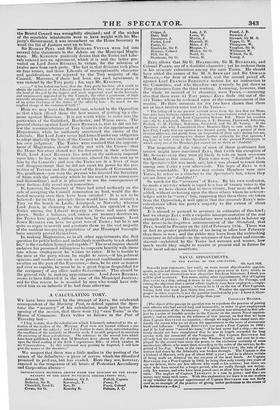A CALCULATING TORY.
WE have been amused by the attempt of ZETA, the celebrated correspondent of the Morning Post, to defend against the Speciutor the "accuracy" of his calculation, made just before the opening of the session, that there were 312 "sure Tories" in the Mouse of Commons. ZETA writes as follows in the Post of Thursday last " I beg to state, that the calculations which I formerly submitted to the attention of the readers of the Morning Post were not formed without a due consideration of the subject ; and I beg further to state, that, notwithstanding the smallness of the minority on Monday week, I am still prepared to maintain the accuracy of those calcuktions. On reference to the several lists which have been published, I find that 72 Members were absent from the division upon the third reading of the Irish Corporations Bill ; of which number 40 are Conservatives. As this statement may possibly be disputed, I will here give the names of the absentees."
We suspect that there was a little malice in ate posting of the names of the defaulters,-'-a piece of service which the Standard promised to perform, but has evaded. Here they are, however, exposed to the vengeance of all lovers of Protestant Ascendancy and Corporation abuses- CONSERVATIVE MEMBERS ABSENT FROM THE DIVISION ON THE THIRD READING 05' THE IRISH MUNICIPAL CORPORATIONS BILL.
AIIWOOd, M. Johnston, Sir J. Polhill, Captain
Bulkeley, Sir R. Kavanagh, T. Pusey, P. Churchill, Lord C. Ker, D. Parry, Colonel
Crewe, Sir G. Kearsley R. Pelham, J. C.
Martin, J.
Davenport, J. Stewart, Sir M. S.
Forbes, Lord Maxwell, II. Tapps, G. W. Foster, C. Miles, J. P. Thompson, W. Goodrieke, Sir F. Morgan, C. Vaughan, Sir R. Hanmer, Colonel Mosley, Sir 0. Whitmore, W. Hill, Sir IL Neeld, G. Wilmot, Sir E.
Ileatheote, Sir G. Owen, H. Young, J.
ZETA allows that Sir G. HEATHCOTE, Sir R. BULKELEY, and Colonel PARRY, are of a doubtful character; yet he reckons them in his accurate calculation among the sure Tories. He should have added the names of Sir M. S. STEWART and Sir OSWALD MOSLEY,—the first of whom voted, and the second paired off, against Lord FRANCIS EGERTON'S motion for an instruction to the Committee, and who therefiire can scarcely be put down as Tory absentees frgm the third reading. Assuming, however, that the whole 90 instead of 35 absentees were Tories,— assuming also that there were 61 Tory pairs,—ZETA finds 302 out of the 312 Tories whom he reckoned upon at time commencement of the session. He thus accounts for ten (we have shown that there are at least twelve) votes lost to the Tories " The falling-off in my present account arises fr the fact that ten Mem. hers who have hitherto exhibited a leaning to Conservatism voted in favour of the thild reading of the Irish Corporation Reform bill. These ten seceder. are—Sir G. Cockerell, Alessrs, Mayo, J. E. Denison, Fleetwood, Johnston, Peebell, C. M. Phillips, Robinson. Scouifield, and Sir H. Verney. If the Spectator asks why 1 consideied the,e Members likely to vote with Sir Ho. bert Peel, 1 reply that my opinion was formed partly from a perusal of their election addre,ses, and partly from an inspection of their votes during last Beth sion ; and if your contemporary desires further authority for that opinion, I beg leave to refer him to the Spectator's list of the present Parliament, in which every one of the Members just named are set down as ' doubtful.'" The inspection of the votes of most of these gentlemen last session might have convinced ZETA, that (with the exception of Mr. Senora-is:LW they were all likely to vote on most occasions with Ministers this session. Their votes were "doubtful" when the Spectator's list was made out; but it was absurd to count them among sure Tories a year afterwards. Time logic of ZETA is not a little remarkable. To prove that certain Members were sure Tories, he refers as a clincher to the Spectator's list, where they are set down as "doubtful!"
So much for the "accuracy" of ZETA. By his own confession, he made a mistake which is equal to a loss of twenty votes to the Tories ; we have shown that to these twenty, four more should be added, without reckoning upon the three others whom he acknowledges not to be "sure ;" but, supposing that these three are taken from the Opposition, it will appear that tlie accurate ZETA'S miscalculations affect his party's majority to the extent of about thirty votes. It is absurd to pretend to accuracy in estimates of this kind; but we charge ZETA with a culpable misrepresentation of the real strength of parties. His calculations were intended to bolster up time never-to-be-tergotten announcement of the Standard. that PEEL would be Premier on the 22d of February 1836. There was in fact no greater probability of his being in office last February than there is now; and the public may learn from the unblushing assurance in falsehood—in the utterance of lies direct and circumstantial—exhibited by the Tories last autumn and winter, how much credit they ought to receive at present and in future for their most solemn assertions.


























 Previous page
Previous page